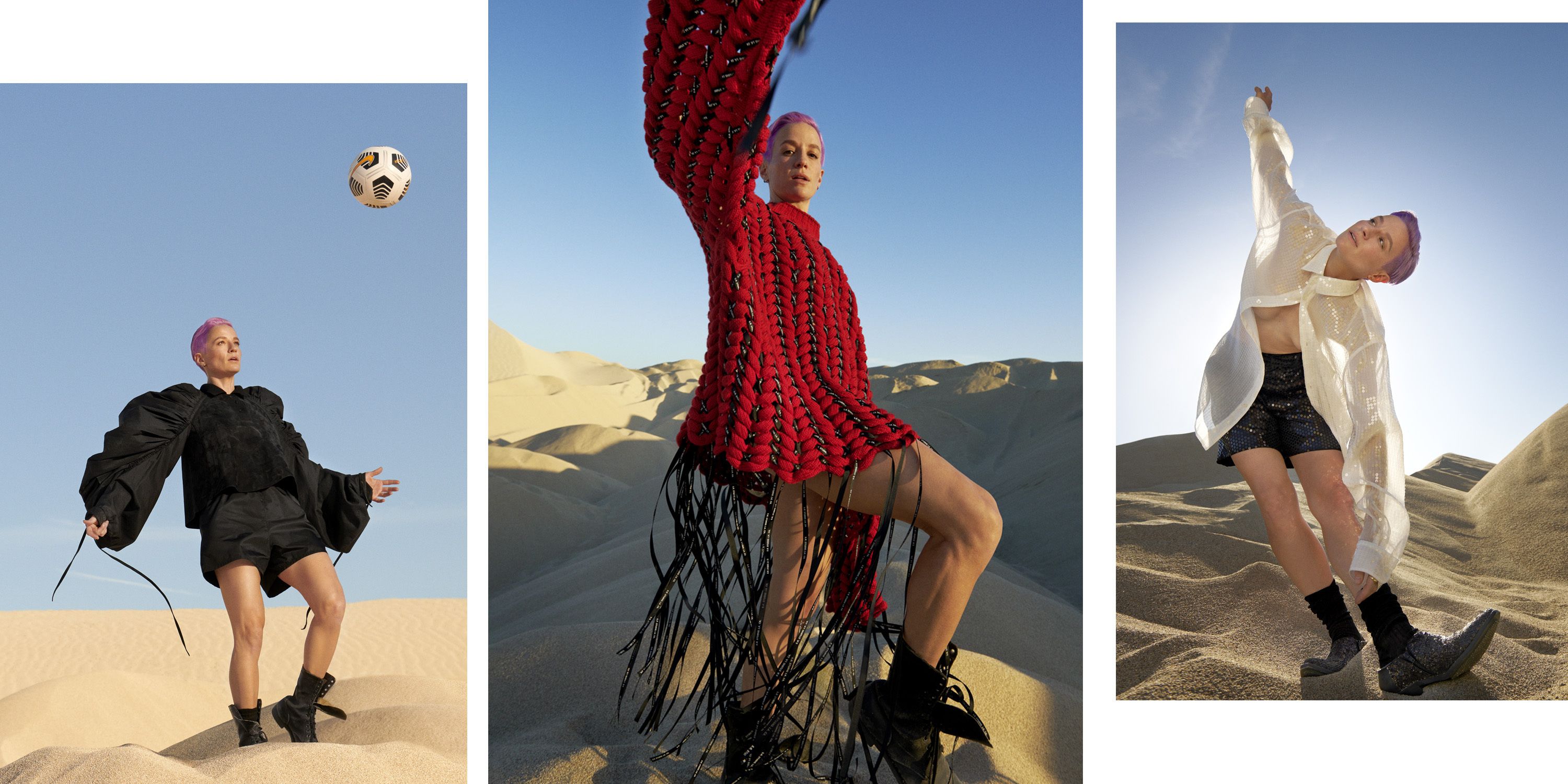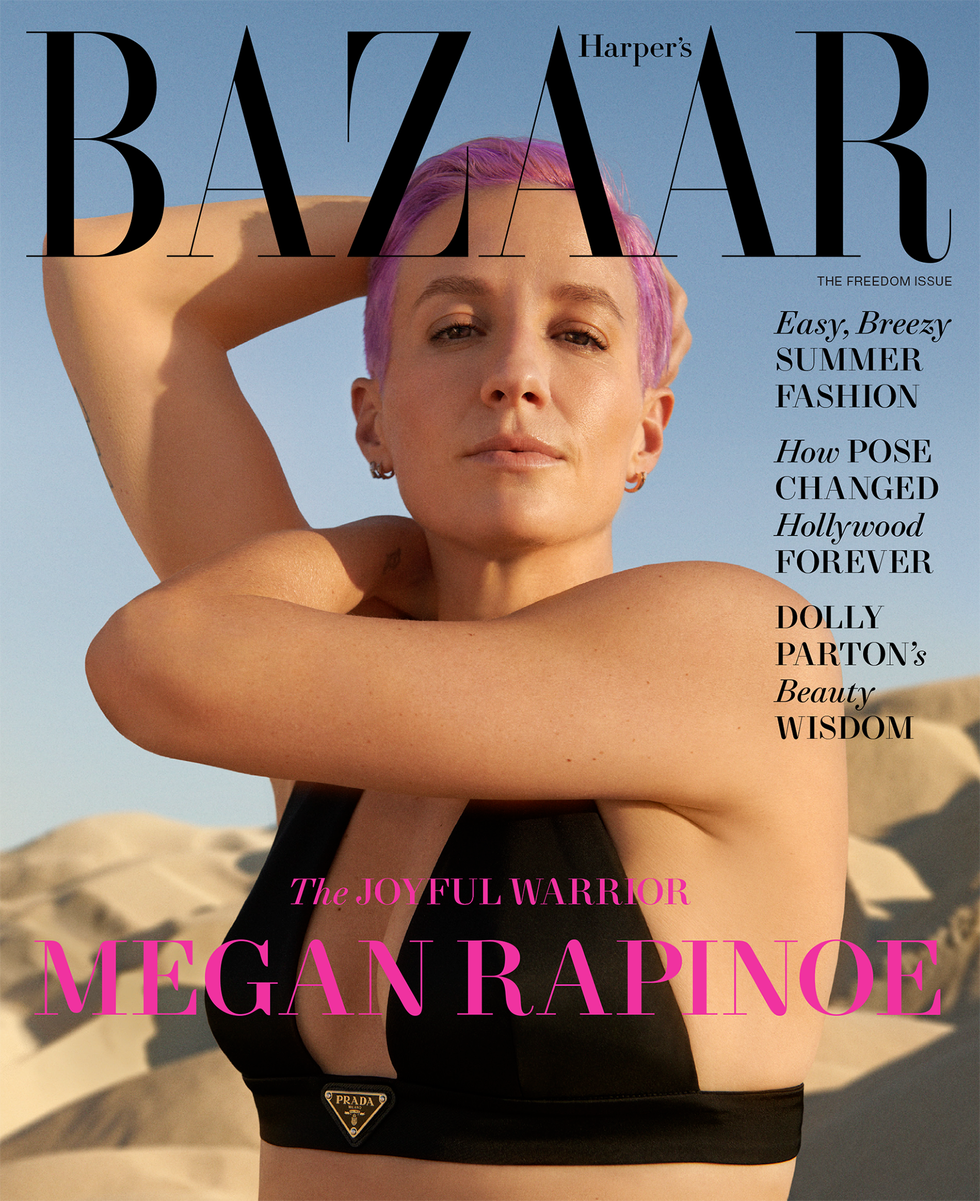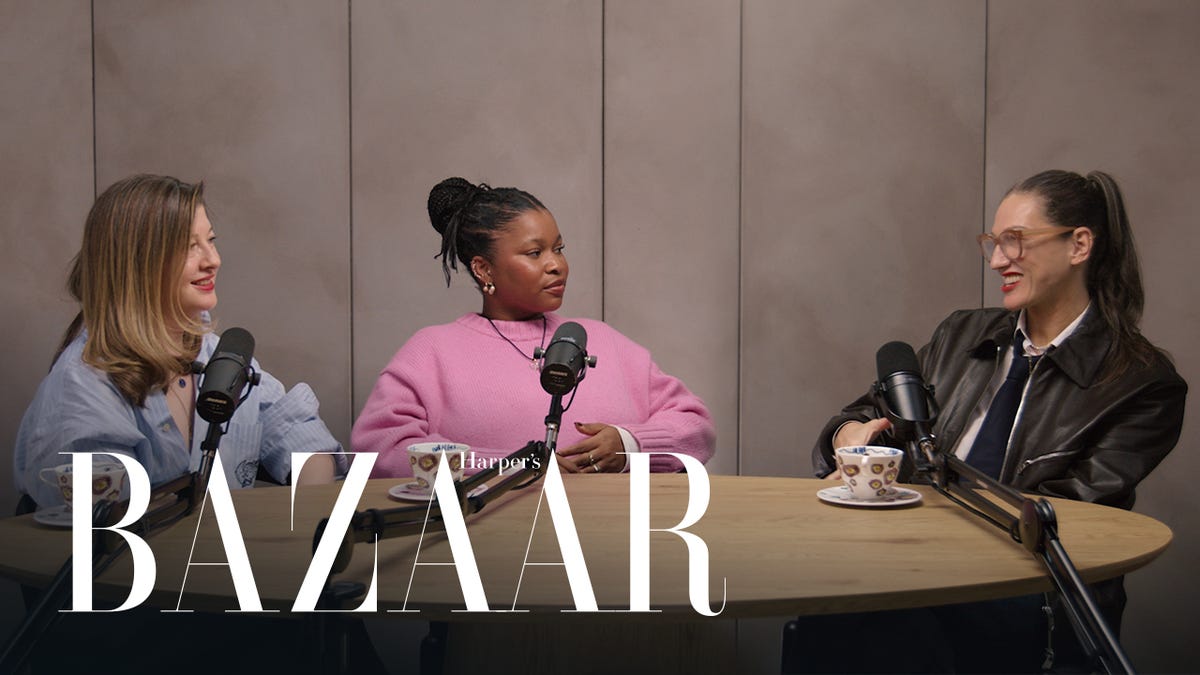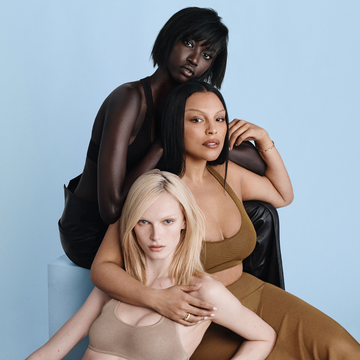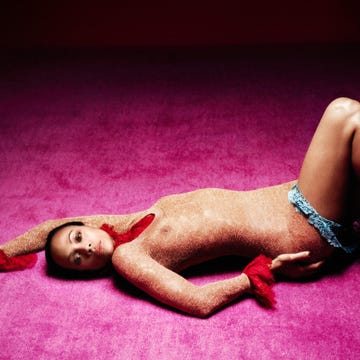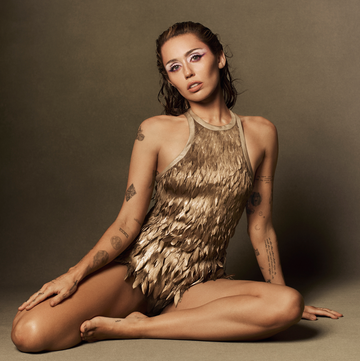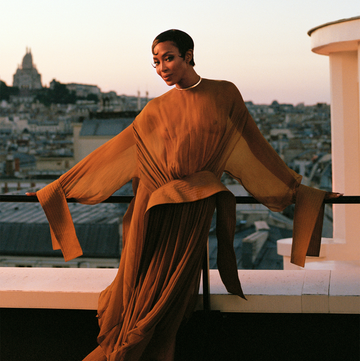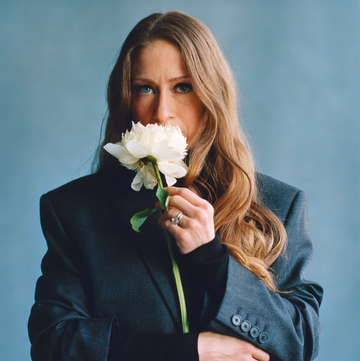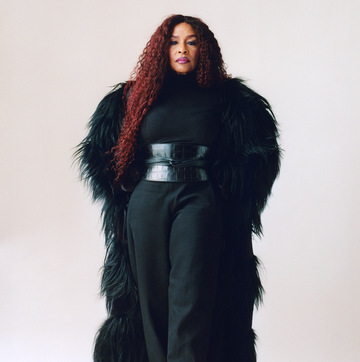Late into the night of the Moët-soaked celebrations for the 2020 WNBA championship last fall, Megan Rapinoe was letting loose with her now fiancée, Sue Bird, the great Seattle Storm point guard, when she found her opening.
“I had gotten wind that one of the WNBA referees could do stick-and-poke tattoos,” she tells me one sunny day in April from her hotel room in Sweden over Zoom. The 35-year-old star soccer player and activist is in a post-practice repose: barefaced in a black hoodie with her faded purple hair tousled like she’s just woken up from a nap and gold rings on her fingers. “I’m not going to use her name,” she says, somewhat soberly, referring to the tattooing ref before laughing. “I’m not even sure they’re supposed to be doing that!”
In the next few days, Rapinoe will play friendly matches with the U.S. Women’s National Team (USWNT) against Sweden and France (scoring in each), with the pandemic-postponed Summer Olympics in Tokyo now fast approaching. Last year, she sat out her club team’s (Tacoma, Washington’s, OL Reign) entire season over concerns about Covid, instead accompanying Bird inside the Wubble (the WNBA bubble in Bradenton, Florida). There, players, staff, and refs were sealed off from the rest of the world in unusual intimacy. Rapinoe found herself in the entirely new role of superfan, putting together big fits (pink-and-blue tie-dyed pants, red Air Jordan 1s, a say her name tee) for Bird’s night games, and training in the morning.
Rapinoe also found herself in need of another tattoo. “Okay, I need to weasel my way into a relationship with this ref,” she says with a sheepish grin, of her thinking in the weeks leading up to the championship. “I gotta convince her that this is a good idea.” That kind of thing isn’t usually a problem for Rapinoe. “She’s infectious,” says Bird. “Whether you’re doing fireball shots or talking about equal pay, she just has a way of drawing people in.” And on the very last night in the Wubble—after the Storm crushed the Las Vegas Aces, 92–59—Rapinoe, several vodka sodas deep, ended up chilling with our mystery ref and getting a stick-and-poke dedication to her mother. (“It kept us two hours longer,” says a bemused Bird.)
Rapinoe lifts her left hand to the computer camera, a beaded gold bracelet falling down her arm, to show me the upward-sloping tattoo at the top of her wrist. “That’s her nickname, Mammers,” she says. “And it’s in Sue’s handwriting, so that’s kind of special too.”
Mammers is short for “Mammer Jammers,” the nickname Rapinoe’s mother acquired during the 2011 World Cup, when a “wild” bout of menopause made her particularly sensitive to smell and touch, and she brought a fresh pair of pajamas for every night of the trip. “She’s got fucking endless pajama sets,” Rapinoe says with an eye roll. She wanted to surprise her mother with new ink. “She would be like, ‘Oh, my God, you shouldn’t have done that,’ ” says Rapinoe doing a high-pitched caricature. “But she’d really secretly be like, ‘Oh, my God, I love it so much.’ ”
When Rapinoe was growing up in Redding, California, her tight-knit family—including mom Denise, dad Jim, brother Brian, sister Jennifer, twin Rachael, and aunt CeCé—was a cacophony of personalities. Young Megan, eyes twinkling, would ham it up for the crowd, doing her best Jim Carrey impressions (allllrighty, then!) to draw attention and laughs. At other times, raw feelings—anger, hurt, frustration—welled up from tides so strong, she was carried away in the break, and ran to her room rage-howling, hiding until she had corralled her emotions. As a skinny-legged seven-year-old, Rapinoe insisted on a bowl cut and boy clothes, announcing, hands on hips, to her first-grade class, “Brian Rapinoe is my brother, and I’m just like him!” In that defiant pronouncement, you can hear the echo of Rapinoe’s now famous unapologetic declaration made during the 2019 World Cup, “I’m not going to the fucking White House.”
Rapinoe’s outbursts of enthusiasm occasionally bucked authority, but her mother gave her space while keeping a watchful eye. “We didn’t have any kind of progressive language around expressing your identity,” Rapinoe says. “But from a young age, my mom really understood me. I think she knew that I was a little bit different.”
Still, there were rules, among them that when Mom whistled, you hightailed it home for dinner. “You do not disobey the whistle,” says Rapinoe. Over the years that “iconic” two-finger whistle transformed from dinner bell to sports-game holler. In the epic 2011 World Cup semifinals against Brazil, after Rapinoe floated a bonkers long cross to Abby Wambach to tie the game in overtime, she heard it cut through a stadium of roaring fans. A big grin crossed her face—an aural tether from Germany to rural California, World Cup hero to skinned-knee kid, mapped out in the neural pathways of her brain.
There was a simple lesson in the rule of the whistle: You have freedom to be yourself, but you still have duties to family and community. “My mom is one of eight kids from a very poor family,” Rapinoe told me when I first met her on assignment in Seattle two years ago. “They got made fun of all the time; they didn’t have any money, and wore shitty clothes and whatever. She instilled this empathetic view in us.”
That empathy has driven Rapinoe’s activism. “One of the greatest gifts I’ve been given is to be gay and to have this perspective,” she says. To her, it’s all connected: kneeling for racial justice, the equal pay fight, defending trans kids in a Washington Post op-ed. In the past year, Rapinoe’s voice has gained prominence in the political arena: She endorsed Senator Elizabeth Warren in the Democratic presidential primary; interviewed Representative Alexandria Ocasio-Cortez about the first Covid relief bill on Instagram; and filmed the HBO special Seeing America With Megan Rapinoe. When I asked her what keeps her up at night in a post-Trump world, she answered without hesitating: “Voter suppression. Holy shit!”
Rapinoe’s sister Jennifer Brooks, who is nine years older, recalls watching Megan and her twin, Rachael, at four or five years of age, ferociously competing with each other in the backyard. “You could see the determination and skill,” says Brooks. “It just was unreal. I remember thinking, ‘Oh, my gosh, they’re going to be in the Olympics someday.’ ”
On Rapinoe’s right wrist she has a “W” tattoo, a marking she shares with Brooks. “The line of the women in our family, we’re warriors,” says Brooks. “That ‘W’ on her wrist is for ‘Warrior Woman.’ We’re just driven, and Megan has always been overdriven.”
In early March of 2020, Rapinoe—two-time World Cup winner, Olympic gold medalist, 2019 Ballon d’Or female player of the year—crouched outside an apartment doorway efficiently swabbing boxes and cans with Clorox wipes. Bird—four-time Olympic gold medalist, four-time WNBA champion, 11-time All-Star guard—ferried armfuls of groceries to the refrigerator, arranging two weeks’ worth of sustenance like Tetris pieces until everything fit. They had a system.
“Megan, if I give her a list of things to do, she will attack the list: BOOM! Check! Check! Check!” Bird tells me. Bird, on the other hand: “I like to strategize.” As the country went into lockdown, the pair hunkered down in Bird’s Greenwich, Connecticut, apartment, reconfiguring the living room to accommodate a home gym and visiting Bird’s sister, brother-in-law, and two young nieces in their yard down the street. While most friends and family consider Rapinoe and Bird basically married, Bird says, “The little ones were putting on the heat” about an engagement. “I kind of miss it,” Bird says of that time. “There was something nice about just waking up with each other.”
Until the coronavirus hit, it was nonstop for Rapinoe, “a shot on a rocket to the moon,” as she describes it. The Women’s National Team has been fighting for fair contracts since the ’90s. (In LFG, the feature documentary chronicling their fight that premieres on HBO Max on June 24, Julie Foudy, who played from 1988 to 2004, recalls that their generation’s motto was “GFY”—“Go fuck yourself”—which they repeated to their lawyer in response to every insulting contract offer from the U.S. Soccer Federation, the sport’s national governing body. “LFG” is also a nod to the current team’s rallying cry, “Let’s fucking go.”) But the magnitude of the 2019 World Cup win launched the team’s fight for equal pay, and Rapinoe, into another stratosphere. (The players had filed a lawsuit accusing U.S. Soccer of gender discrimination three months before the tournament began.) Afterward she was flying cross-country for television interviews (Rachel Maddow, Seth Meyers) and magazine cover shoots (Sports Illustrated, Time), in between club play and late-night prepping for the team’s legal battles.
Rapinoe’s celebrity is born out of her ability to give freakishly commanding performances under pressure, like scoring two goals in the World Cup quarterfinals after Trump had a tweet meltdown over her comment about refusing to go to the White House (“Megan should WIN first before she TALKS!”). Even on the talent-stacked USWNT, she takes almost every free kick. “Pinoe’s got these hip joints that basically pop out of the sockets, so she can just hit balls with this whip in the spin,” says defender and team captain Becky Sauerbrunn, who has known Rapinoe since their days on the U-16 National Team. “When she’s on the ball, it’s always a goal-scoring opportunity.”
But her appeal also lies in the insuppressible spirit and deeply felt sense of right and wrong she’s displayed since she was a kid. “When Pinoe speaks, everyone listens,” Sauerbrunn says of the team’s equal pay discussions. “She can inspire and move people in a way that I haven’t seen a lot of other people be able to do.” In March, for Equal Pay Day, Rapinoe and teammate Margaret Purce spoke alongside President Joe Biden and First Lady Jill Biden at the White House. (“Have you ever watched them play? They are incredible!” exclaimed President Biden.)
Feminists and marginalized people fighting for basic rights often get flattened as miserable scolds. But Rapinoe has a way of reaching beyond the sexism and homophobia. “Her charisma and witty humor bring people along,” adds Sauerbrunn. In that way, Rapinoe’s righteous joy is almost a radical act in itself.
Despite years of resistance, it seemed like equal pay was inevitable after the 2019 World Cup. The team broke its own broadcast records (again), with 1.12 billion viewers; smashed Nike’s soccer jersey sales; and returned home to a New York City parade with thousands of fans chanting, “Equal pay!” A sense of optimism abounded. When I ask Rapinoe whether she expected that U.S. Soccer would be forced to finally relent following the groundswell of support, she replies, “I really did to be honest.” The lesson: “You can’t overachieve discrimination.”
Instead the Federation stepped up obstructionism, ignoring the Women’s National Team’s detailed proposals, dragging their feet through mediation talks, and hiring two lobbying firms to plead their case in Washington, D.C. The final straw came in March of last year, during the SheBelieves Cup, part of U.S. Soccer’s own program “to encourage young women and girls to reach their dreams.” They made a court filing so cartoonishly misogynistic, it went viral, arguing that the job of the men’s team “carries more responsibility” and “requires a higher level of skill” than that of the women’s. “That was a fairly big ‘fuck you’ to us,” says Rapinoe.
Two months later, the women’s team received a devastating blow in the form of a partial judgment in their case, with the judge dismissing the claim of unequal pay, arguing that the women had rejected an offer to be paid under the same pay-to-play structure as the men. “Every line item was less,” contends Sauerbrunn.
“We were offered the same structure with like a third of the money,” Rapinoe says. “Why would we forgo at least having something guaranteed to make a third and take all that risk?”
Last December, the women’s team settled the most egregious inequitable working conditions out of court: getting charter flights and beefed-up staffing equal to the men, as well as veto power on the fields they play on. Artificial turf, a surface almost never seen in the men’s game, has long been a sticking point. While natural grass sod is softer and springier, turf—an old-tire sandwich with sand in the middle and a topping of crumb rubber and millions of sharp polymer blades—is punishing, an undoing of all the fine-tuned recovery work (Pilates, ice baths, therapeutic massages) elite athletes do for marginal gains.
“It’s just hard on your body. Your ankles hurt, your joints hurt, you get turf burns,” Rapinoe says. “The ball bounces differently. And sliding on it, getting the friggin’ turf beads everywhere.”
That’s the insidious thing about sexism, or any discrimination, really—it’s not just the big-ticket items but the thousands of plastic blades tearing at you every day. One way of evaluating the women’s soccer fight for equity, as many have, is by picking apart a complex matrix of revenues, TV ratings, and games played. Or you could just look at it like this: Futbol’s most powerful governing bodies wouldn’t give the world’s winningest women’s players some freaking grass. They had to sue.
While the women’s team is hopeful about negotiating a fair collective bargaining agreement before the current one expires at the end of this year, the dispute over back pay still lingers, with U.S. Soccer claiming it would bankrupt them. (“I’m sorry that you practiced gender discrimination and didn’t budget that in,” retorts Rapinoe. “But they’re going to need to reallocate.”) So the struggle continues. “Money is the way our society shows people, especially in sports, how we value them,” Rapinoe says. “We know exactly what’s in a contract every time a man signs it. We never know what women make. Why is it? Because they’re not something to be proud of. We need to change that narrative.”
One of Rapinoe’s greatest athletic talents is her Matrix-like vision on the field. She has an uncanny sense of players’ whereabouts, and can game out surprising next moves like a chess master. After a pandemic year away, she returned to the pitch for February’s 2021 SheBelieves Cup, scoring three goals, with her mother’s two-finger whistle ringing out from the sparse stands. In the 2-0 win over Brazil, Rapinoe ran behind a defender and then cut in front of her at the last second to score on a cross, almost effortlessly volleying the ball past the keeper in the 88th minute.
Celebrating the goal, a beaming Rapinoe blew a kiss and mimed rocking a baby—a shout-out to her married teammates, Ali Krieger and Ashlyn Harris, at home with their newly adopted daughter, Sloane. “Often the stories we hear about LGBTQ, it’s so much about the struggle, that it’s going to be hard to come out,” says Rapinoe, who was the first Women’s National Team player to come out publicly almost a decade ago. “It’s really important to show the beautiful joys of being gay.”
With her third Olympics on the horizon, Rapinoe has completed a five-year Homeric journey. She and Bird met at the 2016 Rio Olympics. Their relationship started just as Rapinoe was being consumed in a firestorm over her kneeling in support of racial justice during the national anthem before games, jeopardizing her career. In June 2020, after the George Floyd protests began, U.S. Soccer repealed and issued an apology for its former policy banning kneeling, and the women’s team has been wearing “Black Lives Matter” warm-ups to games.
Little known is that Rapinoe originally slid into Bird’s DM’s to ask about the WNBA’s activism, and her first protest was actually at one of Bird’s WNBA games, where she stayed seated during the national anthem. Only Bird noticed.
Rapinoe and Bird got engaged in October. (“I had to lock that right down,” she says.) It will be the last Olympics for Bird, who is 40, she has said; Rapinoe is on the cusp. Bird’s eight-year-old niece has already written her bridesmaid’s speech. And the couple are thinking about a weeklong wedding in a warm locale to stretch out the time with loved ones. “One thing that sports taught both of us is, when you have big moments, like a championship win, once that moment’s over, you can’t re-create that energy,” says Bird.
Rapinoe is well aware that these tender moments of joy in life are hard-won—and that there are challenges ahead. “We need to be really focused,” she says. “It’s our responsibility to be civically engaged. Ultimately we choose what kind of system we want to live with. And we don’t have to live in this type of system anymore.”
Hair: Johnnie Sapong; Makeup: Nina Park; Manicure: Emi Kudo for Chanel Le Vernis; Production: Alicia Zumback and Patrick Mapel at Camp Productions; Prop Styling: Julien Borno.
